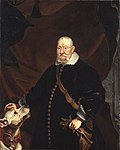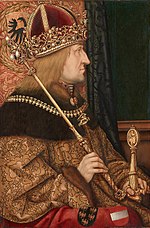The imperial election of 1619 was an imperial election held to select the emperor of the Holy Roman Empire. It took place in Frankfurt on August 28. This...
5 KB (565 words) - 10:58, 24 March 2024
later. Having refused to become a candidate for the imperial throne in the 1619 imperial election, Maximilian was faced with the complications arising...
14 KB (1,457 words) - 00:29, 4 August 2024
Bohemian Revolt (category Conflicts in 1619)
result, Ferdinand had no difficulty in securing election as Holy Roman Emperor at the 1619 imperial election, which greatly strengthened his hand. Even James...
13 KB (1,251 words) - 15:03, 17 September 2024
The imperial election of 1653 was an imperial election held to select the emperor of the Holy Roman Empire. It took place in Augsburg on May 31. This was...
4 KB (430 words) - 12:59, 13 November 2023
The following is a list of imperial elections in the Holy Roman Empire. Entries in italics are for elections where the claim of the man elected to be...
11 KB (34 words) - 08:22, 1 August 2024
Maximilian I, Duke of Bavaria as an opponent to Ferdinand II at the 1619 imperial election. After Frederick was elected king of Bohemia, Camerarius followed...
5 KB (672 words) - 18:08, 29 March 2024
The imperial election of 1636 was an imperial election held to select the emperor of the Holy Roman Empire. It took place in Regensburg on December 22...
4 KB (425 words) - 15:02, 29 April 2024
Frederick V of the Palatinate (category Imperial vicars)
Holy Roman Empire from 1610 to 1623, and reigned as King of Bohemia from 1619 to 1620. He was forced to abdicate both roles, and the brevity of his reign...
52 KB (6,286 words) - 12:53, 3 September 2024
Matthias died in March 1619, since many believed the loss of his authority and influence had fatally damaged the Habsburgs. By mid-June 1619, the Bohemian army...
121 KB (14,374 words) - 23:13, 23 September 2024
1637) was Holy Roman Emperor, King of Bohemia, Hungary, and Croatia from 1619 until his death in 1637. He was the son of Archduke Charles II of Inner Austria...
70 KB (8,572 words) - 06:33, 18 August 2024
House in 1556 by ceding Austria along with the Imperial crown to Ferdinand (as decided at the Imperial election, 1531), and the Spanish Empire to his son Philip...
39 KB (3,838 words) - 20:58, 18 September 2024
John George I, Elector of Saxony (category Imperial vicars)
George was easily induced to vote for the election of Archduke Ferdinand of Styria, as emperor in August 1619, an action which nullified the anticipated...
14 KB (1,277 words) - 21:29, 1 September 2024
Ferdinand II (r. 1619–1637), who sought to combine universal jurisdiction with actual universal temporal rule and universal imperial authority, represented...
62 KB (8,606 words) - 15:22, 17 September 2024
Austrian Empire (redirect from Imperial Austria)
Google Books PT196. Bassett, Richard. For God and Kaiser: The Imperial Austrian Army, 1619–1918 (2016). Evans, R. J. W. (2006). Austria, Hungary, and the...
49 KB (4,927 words) - 03:48, 11 September 2024
assemble for a new imperial election. During that time, imperial institutions still required oversight. This was performed by two imperial vicars. Each vicar...
10 KB (983 words) - 03:13, 19 February 2024
Charles Bonaventure de Longueval, 2nd Count of Bucquoy (category Imperial Army personnel of the Thirty Years' War)
Budweis in January 1614. Shortly after his election, Emperor Matthias invited Bucquoy to take charge the Imperial Army and he accepted the post in August...
7 KB (569 words) - 13:59, 2 November 2023
was made for Charles IV in 1347. On top are inscribed four symbols: the Imperial eagle, Bohemian lion, the coat of arms of Arnošt of Pardubice and emblem...
15 KB (1,191 words) - 10:12, 12 July 2024
Franz Joseph I of Austria (category Burials at the Imperial Crypt)
Franz Joseph was consistently built up as a potential successor to the imperial throne by his politically ambitious mother from early childhood. Up to...
89 KB (9,241 words) - 07:51, 26 September 2024
Succession of the Roman Empire (redirect from Imperial idea)
deprive the emperor of his imperial dignity. The Dictatus papae, a papal document issued in 1075 shortly after the election of Gregory VII, states that...
100 KB (11,925 words) - 09:28, 19 September 2024
Markus Sittich von Hohenems (category 1619 deaths)
Years' War in 1618. On 16 July 1619, he received the Habsburg archduke Ferdinand II en route to the Imperial election in Frankfurt. Joined by the English...
5 KB (587 words) - 22:47, 8 March 2024
played a vital role in raising the comital House of Habsburg to the rank of Imperial princes. Rudolf was born on 1 May 1218 at Limburgh Castle near Sasbach...
23 KB (2,537 words) - 00:32, 24 June 2024
Austria, and obtained the election as Holy Roman Emperor against the candidacy of the French king. Since the Imperial election, he was known as Emperor...
186 KB (20,205 words) - 21:39, 25 September 2024
Ferdinand III, Holy Roman Emperor (category Burials at the Imperial Crypt)
the election as king of the Romans at the Diet of Regensburg of 1630. After he had unsuccessfully applied for the supreme command of the Imperial army...
39 KB (4,207 words) - 19:49, 26 August 2024
period of free election ended with the ascension of the Austrian House of Habsburg, as an unbroken line of Habsburgs held the imperial throne until the...
49 KB (2,757 words) - 03:12, 26 September 2024
Qing dynasty (section Manchu and imperial religion)
ching), officially the Great Qing, was a Manchu-led imperial dynasty of China and the last imperial dynasty in Chinese history. The dynasty, proclaimed...
159 KB (18,644 words) - 12:09, 9 September 2024
Michael of Russia (section Election)
following 10 children, but according to Samuel Collins (physician, born 1619) Tsar Alexis had an older brother who died young.: Rulers of Russia family...
19 KB (2,010 words) - 18:31, 19 September 2024
House of Burgesses (category 1619 establishments in the Colony of Virginia)
authority would control the military. In 1619, based on the instructions, Governor Yeardley initiated the election of 22 burgesses by the settlements and...
31 KB (3,467 words) - 16:49, 27 August 2024
Matthias, emperor 1612–1619 Ferdinand's inheritance had been split in 1564 among his children, with Maximilian taking the Imperial crown and his younger...
95 KB (9,340 words) - 06:01, 26 September 2024
Frederick V, Elector Palatine as their king, on 26 and 27 August 1619. After his election as German Emperor on August 28, Ferdinand conferred with the spiritual...
25 KB (2,630 words) - 09:05, 21 July 2024
Furthermore, their demands also failed to prevent Ferdinand's election as Holy Roman Emperor in 1619. What the nobles did achieve was that in 1618, in a stormy...
7 KB (883 words) - 16:48, 12 July 2024

























